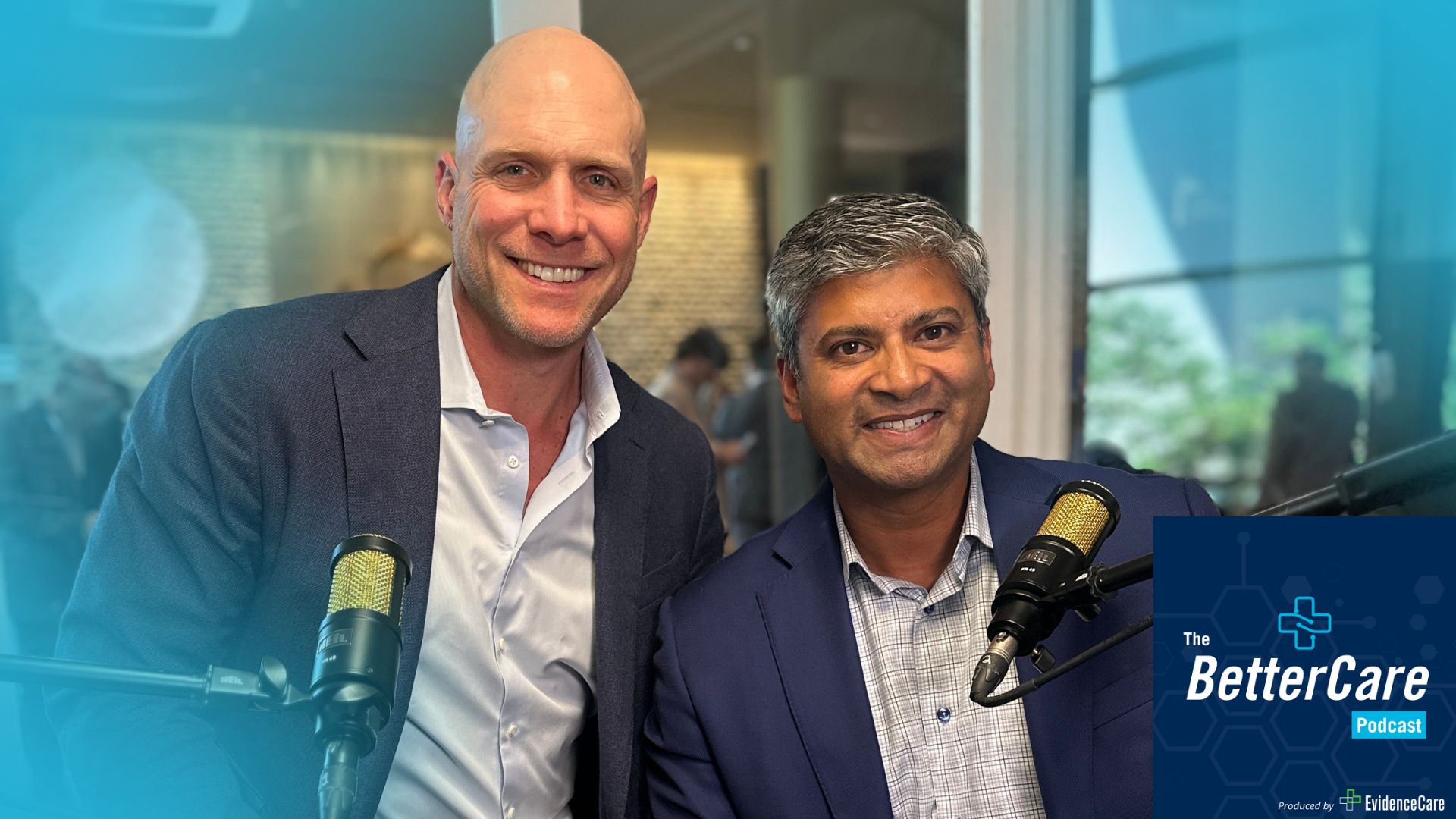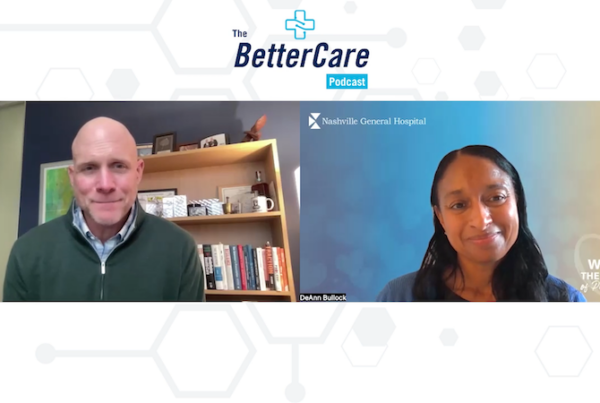At the 2025 Nashville Healthcare Sessions Conference, Jason Zachariah, EVP & COO of Lifepoint Health, sat down with Bo Bartholomew, CEO of EvidenceCare, to discuss the unique challenges facing rural healthcare, the promise of AI-driven innovation, and what it means to lead with both ambition and humility in today’s complex healthcare landscape.
Some quotes have been lightly edited for clarity and brevity.
Ep 31 – Leading a Diversified Health System – Jason Zachariah (Lifepoint Health)
From Mayo Clinic Roots to Healthcare Leadership
Jason Zachariah’s path to leading operations at one of America’s most diversified health systems began in a small Minnesota town, watching his father—a cardiologist who immigrated from India—practice medicine in the shadow of Mayo Clinic. That early exposure to world-class rural healthcare shaped his understanding that exceptional care isn’t reserved for urban centers.
“I saw what really good healthcare looked like and what a small town like Rochester, Minnesota, could do when it came to rural healthcare,” Jason recalled, referencing Mayo Clinic’s origins with a father, his son, and some nuns who built an organization that would rival the best healthcare in London, New York, and Vienna.
After initially pursuing pre-med studies at Duke and later earning his MBA from Northwestern, Jason’s career took him through biotech and eventually into hospital operations. A pivotal moment came when Kindred Hospitals offered him a CEO-in-training program with a two-year timeline to leadership—significantly faster than the six-to-seven-year tracks at other major systems.
That decision set him on a course through post-acute care, long-term acute care hospitals, and rehabilitation facilities, eventually leading him to Nashville and his current role at Lifepoint Health.
A Uniquely Diversified Health System
Today’s Lifepoint Health is far from a traditional health system. Under Jason’s leadership, the organization operates 60 acute care hospitals, soon-to-be 60 rehabilitation hospitals, 25 behavioral health facilities, and 900 clinics across the country.
This diversification strategy sets Lifepoint apart in an industry where most systems expand through traditional acute care acquisitions or outpatient centers. “David [Dill, CEO] likes to say we like to do the hard with heart,” Jason explained, describing the company’s commitment to serving underserved populations across multiple care settings.
The behavioral health focus is particularly significant given America’s mental health crisis. Meanwhile, Lifepoint’s rehabilitation hospitals serve an aging population with an average age of 72—a demographic increasingly choosing to age in place in rural communities rather than relocating to expensive retirement destinations.
Servant Leadership in Action
When asked about his leadership philosophy, Jason emphasized servant leadership, humility, and creating a family atmosphere within the organization.
“I believe so much in getting behind your people and giving your team the credit but also making sure you’re skilling them in the right ways.”
This approach resonates particularly well in rural communities, where Lifepoint’s “folksy” culture—as Jason described it—aligns with local values. The focus on inclusion and belonging extends from executive suites to bedsides, creating an environment where outcomes improve because people feel connected to something larger than themselves.
Reflecting on his career, Jason takes pride in the hospital presidents, CEOs, and senior leaders he’s been mentored by along the way. “It’s been fun to see how you create that family atmosphere,” he noted, crediting CEO David Dill with recognizing and fostering those same values.
Innovation That Empowers Clinicians
At the Sessions Conference, one presentation particularly caught Jason’s attention: Rob Allen, CEO of Intermountain Healthcare, discussing how Microsoft’s AI-powered ambient listening technology achieved a 40% reduction in nursing documentation time.
“I’m happy if I can get a 10% reduction,” Jason admitted. “If they’re achieving 40%, I’m calling our CIO immediately.”
This reaction exemplifies Jason’s approach to innovation—not innovation for its own sake, but tools that directly empower clinicians and improve their daily work.
“If your caregivers are bought in and they’re seeing the value of the innovation, they’re really the ones that are going to make all the good stuff happen.”
Real-World AI Applications: Palantir and Beyond
Lifepoint has made significant investments in Palantir’s Foundry platform, applying technology originally developed for counterterrorism to solve healthcare’s fragmentation challenges. With a potpourri of EMR systems, laboratory information systems, and back-office platforms across 60 hospitals, Lifepoint needed a way to connect disparate data sources.
The results have been transformative. Nurse supervisors now use tablets powered by Palantir to see real-time hospital throughput—from transfer center to emergency department to PACU—replacing the clipboard and paper-in-smock approach of running multimillion-dollar facilities.
“They can see where all those flows are coming in a consolidated way,” Jason explained. “That’s changing our length of stay, changing our patient experience scores, and honestly, saving lives.”
Perhaps most impressive is Palantir’s sepsis detection system, which proactively alerts physicians and nurses by analyzing lab values, vitals, and imaging data. The impact is significant: for every hour a septic patient goes without intervention, their chance of survival drops by 10%. By reducing intervention time by several hours through automated alerts and enhanced bundle compliance, Lifepoint is directly improving mortality and readmission rates.
Dispelling the Myth of Hospital Wealth
One myth that frustrates Jason is the perception that hospital systems are “flush with resources and cash.” This misconception surfaced during recent legislative debates, including discussions around the One Big, Beautiful Bill healthcare reform proposals.
The reality is far different, especially for rural and behavioral health providers. “Rural healthcare is tough. Behavioral healthcare is tough,” Jason noted, pointing to Rush University Medical Center CEO Omar Lateef’s comment about operating on low margins despite running one of Chicago’s largest safety net hospitals.
The challenge is compounded by rising costs—from professional fees for clinical staff who deserve fair compensation for their training and burden of care, to supplies and implants—while hospitals serve as the “catch all” in the healthcare system.
“We’ve got to do a better job telling the public how vital we are to the health and infrastructure of every community in this country, and that we need to be resourced appropriately for it,” Jason emphasized.
Leading Through Paradox
When asked about recent reading that influenced his thinking, Jason pointed to a book on Abraham Lincoln’s leadership during the Civil War. The parallel to healthcare leadership was immediate and powerful.
“You see someone dealing with so many contrarian things at any given time—trying to defeat your enemy and still preserve the union, waging battle while thinking about humanity and equality,” Jason reflected. “I take that to healthcare. We talk about no margin, no mission. We talk about growth and expansion, but our frontline caregivers want to know they’re doing a good job for that patient right in front of them.”
This paradox—balancing organizational growth with individual patient care, margin with mission, innovation with bedside presence—defines modern healthcare leadership. Lincoln’s example of “leading with kindness while being fair and firm” resonates with Jason’s approach to what he calls “inclusive growth.”
“Everyone has to feel they’re a part of something bigger than themselves,” he said, whether through personal clinical ladders, leadership development, or organizational expansion that benefits communities.
The Path Forward
As Lifepoint Health continues expanding its rehabilitation and behavioral health footprint—adding another 10 facilities next year alone—Jason remains focused on the fundamentals: servant leadership, clinician-centered innovation, and serving underserved communities.
The healthcare landscape continues to present headwinds, from OPEC-driven cost pressures to the “silver tsunami” of an aging population with multiple comorbidities, regulatory challenges, and reimbursement constraints. But Jason sees these challenges as opportunities to demonstrate what healthcare leadership can accomplish when it embraces both ambition and humility.
“History always has the ability to teach us lessons for the future, especially with great leaders like Lincoln,” Jason concluded.
A fitting reflection from a leader working to prove that rural and behavioral healthcare can achieve world-class outcomes when properly resourced, thoughtfully led, and powered by innovation that truly serves clinicians and patients.
Listen to the full conversation with Jason Zachariah on Episode 31 of The BetterCare Podcast to hear more about Lifepoint Health’s approach to rural healthcare, AI implementation strategies, and lessons in servant leadership.









